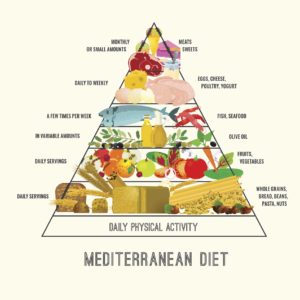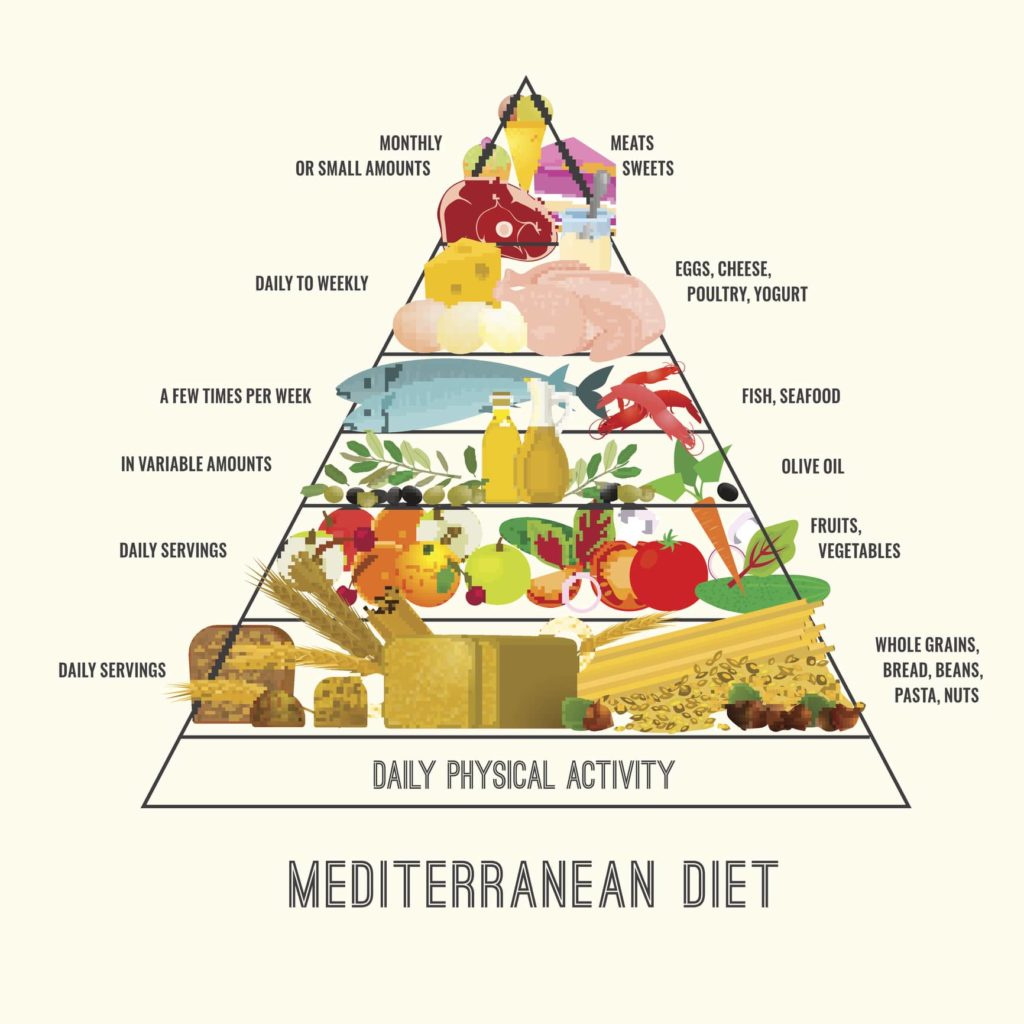 Foods like whole grains and extra virgin olive oil constitute the base of the Mediterranean Diet, which has been historically associated with longevity and good health.[1]The health outcomes of adhering to the Mediterranean Diet include lower rates of obesity and decreased risk of chronic diseases.[2]Learn the key ingredients to live a long, happy, and healthy life!
Foods like whole grains and extra virgin olive oil constitute the base of the Mediterranean Diet, which has been historically associated with longevity and good health.[1]The health outcomes of adhering to the Mediterranean Diet include lower rates of obesity and decreased risk of chronic diseases.[2]Learn the key ingredients to live a long, happy, and healthy life!
Traditional, healthy, and balanced:
The Mediterranean Diet has been ranked as the second best overall diet and has been awarded the first place for the best plant-based diet by the U.S. News and World Report, anauthoritative American ranking organism.[3]
The traditional way of eating from the Mediterranean territories has gained an outstanding reputation with experts (from both scientific fields of nutrition and dietetics as well as holistic fields) and it has enlisted thousands of health-pursuing recruits from all backgrounds who are looking for an eating pattern that is easy to follow and offers an array of tasty balanced meals without obsessively counting calories.
This is due to the fact that the Mediterranean Diet contains recommended amounts of protein, carbohydrates, and healthy fats, and does not call for excluding anyone´s favorite food group.
In addition, it promotes weight loss, supports longevity, and has the potential to keep you off diabetes, heart disease, hypertension, and another lot of major chronic degenerative ailments that currently afflict millions around the world.[4]
The health promise:
Below are some of the most researched health benefits of the Mediterranean Diet according to Dr. Antonia Trichopoulou from the University of Athens.[5]
- Increase your life expectancy.
- Lower your risk of cardiovascular disease.
- Prevent type 2 diabetes, metabolic syndrome, cognitive impairment, and unipolar depression.
- Protect against the occurrence of gastric, colorectal, and breast cancer.
Mediterranean Diet Food Pyramid:
The Mediterranean Diet Food Pyramid[6]is mainly a plant-based dietary pattern and serves as a visual guide for anyone who wishes to follow the hale and hearty trail of those sunny parts of the world, even if they live far away from the ocean breeze and golden hills!
It was first introduced by Oldways(a nonprofit food education organization), the Harvard School of Public Health, and theWorld Health Organization. However, other groups and health practitioners have developed their own version. That is the case of Dr. Andrew Weil, who created his Anti-inflammatory Diet based on the Mediterranean Diet Food Pyramid and some aspects of the Traditional Japanese Diet.[7]
The key ingredients of the Mediterranean include:
- Grains, fruits, vegetables, nuts, legumes, seeds, and olives sit at the base of the pyramid as a single group to emphasize their health benefits.[8]
- These foods provide dietary fiber, vitamins, minerals, phytochemicals, and phytosterols.
- Cereals such as wheat, oats, rice, rye, corn, and barley are consumed at every meal, preferably as whole grains like bulgur wheat or minimally processed products such as whole wheat flour bread.
- Fruits are usually eaten in their whole form while in season and a bounty of vegetables is often consumed either raw or cooked.
- Extra virgin olive oil, nuts, and seeds frequently constitute the main source of healthy fats
- Fish and shellfish supply clean proteins and omega fatty acids, which are known for their anti-inflammatory properties and are recommended twice a week.
- Poultry, eggs, and good quality dairy products are enjoyed occasionally in smaller portions.
- Red meat and sweets are limited and rarely eaten.
- Wine may be consumed regularly but in moderation.
- The use of herbs and spices is encouraged to diminish the consumption of salt and splash the dishes with flavors and aromas of the cultural identities that surround the Mediterranean Sea.
The Mediterranean way of life also celebrates the pleasure of eating and sharing a meal with others as well as staying physically active.
[1]https://www.cambridge.org/core/journals/british-journal-of-nutrition/article/mediterranean-diet-and-longevity/B98CBA0D465AD88365EDC1BB58D8B860
[2]http://ajcn.nutrition.org/content/61/6/1402S.short
[3]http://health.usnews.com/best-diet/mediterranean-diet
[4]http://ajcn.nutrition.org/content/92/5/1189.full.pdf+html
[5]https://bmcmedicine.biomedcentral.com/articles/10.1186/1741-7015-12-112?version=meter+at+null&module=meter-Links&pgtype=Blogs&contentId=&mediaId=%25%25ADID%25%25&referrer=&priority=true&action=click&contentCollection=meter-links-click
[6]https://oldwayspt.org/history-mediterranean-diet-pyramid
[7]https://www.drweil.com/diet-nutrition/anti-inflammatory-diet-pyramid/
[8]https://oldwayspt.org/system/files/atoms/files/Med_Diet_Pyramid_Notes_08.pdf

